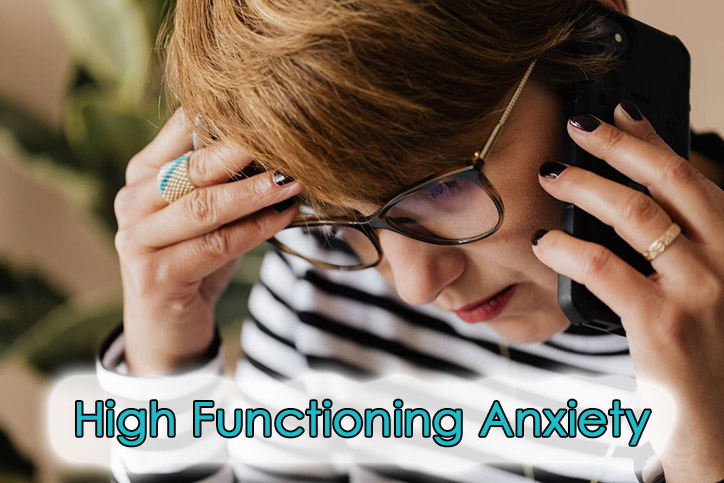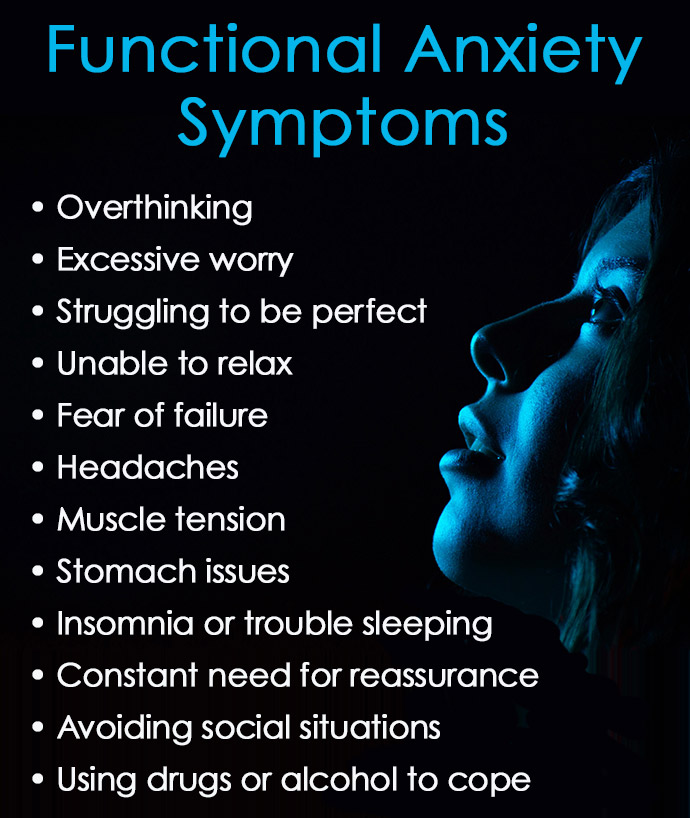High Functioning Anxiety is a term that describes a person who is dealing with stress, anxiety, and worry on the inside, but outwardly appears to be in total control without any noticeable issues.
The condition is sometimes referred to as functional anxiety because it characterizes an individual who functions normally at work or school despite living with daily worry and anxiety.
Understanding more about the condition is helpful for getting the proper care to live a less anxious life.
Fortunately, high functioning anxiety can be treated once the causes and symptoms have been identified.
What is High Functioning Anxiety?
High Functioning Anxiety is a popular term that describes a person living with anxiety who can hide the symptoms from others and continue to be effective with their daily responsibilities.
It is not officially recognized by the DSM-5 as one of the 6 main types of anxiety disorders, or even a subset.
People with functional anxiety often appear to others as strong, confident, and successful at school, work, and even with their personal relationships.
But underneath the happy exterior, they struggle with anxiety that may eventually take a toll on their physical and mental health if it continues unchecked.
Many people with high functioning anxiety live with an undiagnosed form of anxiety because they haven’t sought treatment yet. Instead of seeking help, they endure the constant struggle of stress, fear, and anxiety.
Although the causes and symptoms will be different for every person, it’s common for perfectionists, people pleasers, and overachievers to live with this type of anxiety.
These people have an intense fear of failure and letting others down, so they strive to go above and beyond with everything they do, despite the negative impact it has on their own personal mental health.
What Causes High Functioning Anxiety?
High functioning anxiety is usually caused by a variety of factors related to genetics, environmental issues, and other external circumstances.
Genetics and direct family members with a history of anxiety disorders can increase the risk of anxiety. Some personality types are more inclined to develop anxiety than others.
Children who grow up in a traumatic or abusive home, or one filled with an abundance of stress, can develop anxiety as a teen or adult.
A stressful school or work environment causes many people to struggle with anxiety symptoms, especially those who are perfectionists.
Major life changes, such as moving to a new location, starting a new job, or becoming a first-time parent can cause high functioning anxiety.
The internal worry and stress may be apparent, but they feel they must continue to function normally to fulfill their responsibilities.
Mental health issues like depression or PTSD can lead to anxiety, as well medical conditions such as diabetes, heart disease, and hyperthyroidism.
It’s also common for people to use drugs or alcohol as coping mechanisms that can cause a co-occurring disorder of substance addiction and high-functioning anxiety.
Functional Anxiety Symptoms
High functioning anxiety symptoms are similar or identical to those of other forms of anxiety disorders. Most symptoms are mental or emotional although some can be physical.
People with functional anxiety are very good at hiding the symptoms, and this makes it difficult to identify the correct type of anxiety for treatment to be effective.
When seeking treatment, it’s important to be open and honest with a therapist or medical professional about all noticeable symptoms.
Common Symptoms of High Functioning Anxiety Include:
- Overthinking
- Excessive worry
- Struggling to be perfect
- Unable to relax
- Fear of failure
- Insomnia or trouble sleeping
- Constant need for reassurance
- Avoiding social situations
- Headaches
- Muscle tension
- Stomach issues
- Using drugs or alcohol to cope
These symptoms will vary in severity for each individual and some may come and go over time.
Overthinking and excessive worry are hallmark symptoms of most types of anxiety. They are closely connected with trying to be perfect and pleasing everyone, even though those goals are unrealistic for many situations.
People with functional anxiety have an intense fear of failing and they have a constant need to be reassured by others that they are performing well.
It’s common to avoid social situations where they may be expected to speak or interact with others. A fear of being poorly judged by others causes them to avoid these types of situations.
Constant stress and worry makes it difficult to relax and unwind, which the mind needs to function properly. This leads to insomnia and difficulty sleeping.
Over time, physical symptoms like headaches, tense muscles, and stomach problems begin to appear.
When things become too difficult to deal with alone, it’s necessary to seek treatment.
High Functioning Anxiety and Drug or Alcohol Use
There is a significant connection between high functioning anxiety and substance use disorders like drug or alcohol addiction.
It’s not uncommon for people to use alcohol and drugs to cope with stress, worry, and anxiety. Some stimulant substances help overachievers work longer hours at work or on school projects.
Some people use drugs or alcohol as a way to self-medicate and cope with anxiety symptoms. It’s also possible for people who already have a drug or alcohol dependence to develop a substance-induced anxiety disorder.
Having anxiety or a substance use disorder increases the risk of developing a co-occurring disorder of both conditions.
Research has shown that up to 50 percent of individuals in treatment for alcohol use also experienced one or more anxiety disorders.
How to Treat High-Functioning Anxiety
Like with other anxiety disorders, effective treatment for high functioning anxiety often involves a combination of therapy, lifestyle changes, and possibly medication.
Effective Treatment Methods Include:
- Therapy and Counseling
- Medication
- Lifestyle Changes
- Exercise, Yoga
- Practicing Relaxation Techniques
- Proper Sleep
- Setting Boundaries
- Support
Therapy and Counseling
Below are some evidence-based therapies that have shown to be effective for treating anxiety. Forming a bond with a therapist you trust is key.
Cognitive Behavioral Therapy (CBT) is one of the most widely used therapies for many types of mental health issues. Cognitive behavioral therapy techniques identify and challenge overthinking and behaviors that result in anxiety.
Gestalt Therapy is less commonly used than CBT but works well for some individuals. Gestalt therapy techniques focus on the present moment, personal responsibility, and enhancing self-awareness.
Internal Family Systems Therapy (IFS) is an approach to psychotherapy that promotes trust and healing. IFS Therapy complements other therapies and is beneficial for treating mental health and addiction issues.
Medication
Medication isn’t always required for high functioning anxiety unless the symptoms become severe or unmanageable. Even then, they may only be needed for a short time until the symptoms are stabilized with therapy.
Typical medications for anxiety can include SSRIs like Prozac, Zoloft, or Lexapro, or benzodiazepines such as Xanax in more serious cases.
The best course of action is a combination of medication and therapy together.
Lifestyle Changes
Many lifestyle changes are easy to incorporate into daily life and can have a significant impact on reducing anxiety.
Exercise is one of the most effective methods for improving mental health conditions like stress, anxiety, and depression. Regular and vigorous exercise outdoors at least 3 or 4 days a week will show the most improvement.
Yoga is an excellent form of exercise that also incorporates meditation, mindfulness, and breathing to calm the mind, stay focused on the present, fend off worry, and decrease anxiety.
Eating a nutritious diet, avoiding processed food and alcohol, and maintaining a regular sleep schedule with at least seven hours a night, even on the weekends, is beneficial for boosting mood and reducing stress.
Setting boundaries can be a challenge for those with functioning anxiety because they have a constant need for perfection and high achievement. It’s imperative to learn how and when to say “no” to every request and find ways to assign some responsibilities to others.
Cultivating a support network of trusted friends, family, coworkers, and therapists provides an outlet when things become overwhelming. Sharing your thoughts and worries with others can promote encouragement and reassurance to keep you from internalizing your anxiety.
High functioning anxiety can be difficult to live with, and even harder to spot the signs until it becomes completely overwhelming.
Learning to identify the causes and symptoms, seeking help, and using appropriate treatment methods makes it possible to overcome anxiety and live a happier and healthier life.






